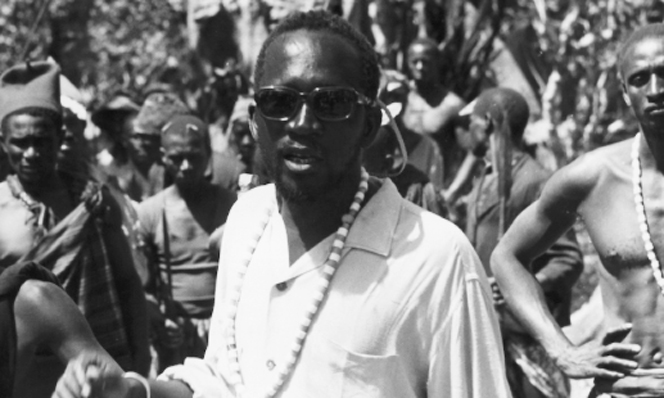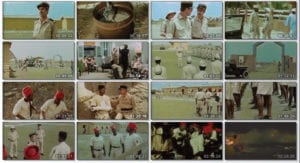
- This event has passed.
Final Friday Film: Camp de Thiaroye

Directed by Ousmane Sembène
From a screenplay by Ousmane Sembène and Thierno Faty Sow
(1987 Senegal 153 mins)
“In this powerful and moving film Sembène, in collaboration with Thierno Faty Sow, who co-scripted and co-directed, reclaims and tells to the world another of those fragments of history concealed by colonialism which he sees it as his task to disinter. Such stories are part of the history not only of Africa, but of the colonial powers, in this case France, as well. “You don’t know natives or the colonies”, Capt. Raymond is informed when, at a meeting at the General’s H.Q., he insists that the Army should honour its obligations to the tirailleurs. France, he argues, cannot successfully reconstruct by “robbing natives”, particularly those who have, as he outspokenly reminds the assembled officers, been fighting the war “in your place, gentlemen”, a reminder that the authorities in Senegal initially collaborated with Vichy. Ironically, it is not his ignorance of “natives or the colonies” that limits Raymond, but his naivety about his fellow Frenchmen: “An officer who does not keep his word is not worthy to wear the French uniform.” When he hears of the massacre in Diatta’s village he is quick to point out that it occurred in 1942, under Vichy. (In Sembène’s 1971 film Emitai massacres in the Diola region from which Diatta comes are shown as continuing after the liberation of France, and De Gaulle’s assumption of power.) Diatta argues that the mentality of colonial armies, be they French or Nazi, is the same, going on to point out that collaborators are surrounding the leader of the Free French and being put in charge of the colonies. Despite his greater historical awareness (Raymond is, in fact, often prepared to defer to his erudition) Diatta too is taken in when the General apparently gives in to the tirailleurs‘ demands, and offers his word “as a general officer”.
“Secondly, debate is very important in African cinema. It draws on the political rituals of traditional society, which, though feudal, had its system of checks and balances, which resulted in some degree of democratic exchange of opinion. In Camp de Thiaroye the tirailleurs use the traditional, highly rhetorical, almost theatrical, mode of debate of their various societies, but adapt this ritual form to the only language they have in common: the pidgin which the French insultingly call “petit nègre”, a language which is both a result and a tool of colonial exploitation. Here it is revealed as having a potential for eloquence, allowing it to become a moving medium for the articulation of feelings, needs, grievances and resistance, and thus ultimately for the development of the tirailleurs‘ collective political awareness and consciousness of themselves as Africans. One consequence of the latter is the decision to choose their own leaders, selecting a representative from each barracks, rather than relying on their nonetheless much loved and respected Sergeant-Major, who has been promoted by the whites. The structures they evolve grow out of their historical situation, and compare strikingly with the rigid hierarchies of colonialism and the military: “The army is discipline. Obedience to your superiors”, the General tells them. The formal pageantry of the parade-ground serves to stifle debate, mask conflict, hide betrayal and destruction, whereas the theatrical exchanges of the traditional discourse offer a forum for debate, evolution and reconciliation.” —James Leahy, Sense of Cinema, October, 2003
Ousmane Sembène was the son of a fisherman, born in Ziguinchor in Casamance to a Lebou family. From childhood Sembène was exposed to Serer religion especially the Tuur festival, in which he was made cult servant. Although the Tuur demands offerings of curdled milk to the ancestral spirits (Pangool), Sembène did not take his responsibility as cult servant seriously and was known for drinking the offerings made to the ancestors. Some of his adult work draws on Serer themes. His maternal grandmother reared him and greatly influenced him. Women play a major role in his works.
In 1944, Sembène was drafted into the Senegalese Tirailleurs (a corps of the French Army). His later World War II service was with the Free French Forces. After the war, he returned to his home country and in 1947 participated in a long railroad strike on which he later based his seminal novel God’s Bits of Wood.

